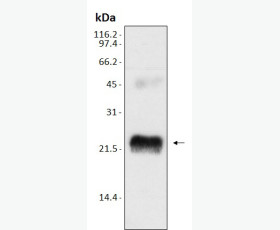Recombinant Mouse Thrombomodulin/BDCA-3/CD141
| Product name: | Recombinant Mouse Thrombomodulin/BDCA-3/CD141 |
| Source: | Human Cells |
| Purity: | Greater than 95% as determined by reducing SDS-PAGE. |
| Buffer Formulation: | Supplied as a 0.2 μm filtered solution of 20mM Tris, 150mM NaCl, pH8.0. |
| Applications: | Applications:SDS-PAGE; WB; ELISA; IP. |
| Storage: | Avoid repeated freeze/thaw cycles. Store at 2-8 oC for one month. Aliquot and store at -80 oC for 12 months. |
| UOM: | 100ug/50ug/200ug/1mg/1g |
| Source | Human Cells |
| Description | Recombinant Mouse Thrombomodulin is produced by our Mammalian expression system and the target gene encoding Leu17-Ser517 is expressed with a 6His tag at the C-terminus. |
| Names | Thrombomodulin; TM; Fetomodulin; CD141; BDCA-3; Thbd |
| Accession # | P15306 |
| Formulation | Supplied as a 0.2 μm filtered solution of 20mM Tris, 150mM NaCl, pH8.0. |
| Shipping |
The product is shipped on dry ice/ice packs. |
| Storage |
Store at < -20°C, stable for 6 months after receipt. Please minimize freeze-thaw cycles. |
| Purity |
Greater than 95% as determined by reducing SDS-PAGE. |
| Endotoxin | Less than 0.1 ng/µg (1 IEU/µg) as determined by LAL test. |
| Amino Acid Sequence |
LSALAKLQPTGSQCVEHECFALFQGPATFLDASQACQRLQGHLMTVRSSVAADVISLLLSQSSMD LGPWIGLQLPQGCDDPVHLGPLRGFQWVTGDNHTSYSRWARPNDQTAPLCGPLCVTVSTATEAAP GEPAWEEKPCETETQGFLCEFYFTASCRPLTVNTRDPEAAHISSTYNTPFGVSGADFQTLPVGSS AAVEPLGLELVCRAPPGTSEGHWAWEATGAWNCSVENGGCEYLCNRSTNEPRCLCPRDMDLQADG RSCARPVVQSCNELCEHFCVSNAEVPGSYSCMCETGYQLAADGHRCEDVDDCKQGPNPCPQLCVN TKGGFECFCYDGYELVDGECVELLDPCFGSNCEFQCQPVSPTDYRCICAPGFAPKPDEPHKCEMF CNETSCPADCDPNSPTVCECPEGFILDEGSVCTDIDECSQGECFTSECRNFPGSYECICGPDTAL AGQISKDCDPIPVREDTKEEEGSGEPPVSPTPGSPTGPPSARPVHSHHHHHH
|
| Background | Thrombomodulin is also known as CD141 antigen and blood dendritic cell antigen 3 (BDCA3), which is encoded by the THBD gene. The deduced amino acid sequence of mouse THBD predicts a signal peptide (aa 1 to 16) and a mature chain (aa 17 to 577) that consists of the following domains: C-type lectin, EGF-like, transmembrane and cytoplasmic. Mouse THBD is corresponding to the extracellular portion of the type I membrane protein. Predominantly synthesized by vascular endothelial cells, THBD inhibits coagulation and fibrinolysis. It functions as a cell surface receptor and an essential cofactor for active thrombin, which in turn activates protein C and thrombinactivatable fibrinolysis inhibitor (TAFI), also known as carboxypeptidase B2 (CPB2). In addition, THBD gene polymorphisims are associated with human disease and THBD plays a role in thrombosis, stroke, arteriosclerosis, and cancer. |














